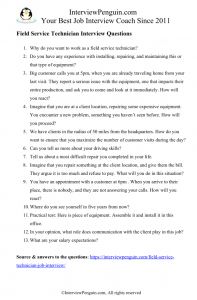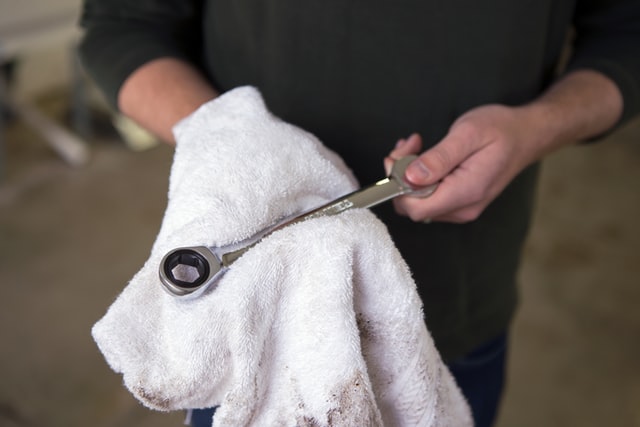Things are built to get broken in the twenty first century. We do not want a washing machine, smartphone, or an assembly line work smoothly for ten or fifteen years. Because then nobody will buy new things, the service technicians will have no job, and companies who manufacture and sell all kinds of technical equipment and tools will bankrupt.
The illusion of a functioning global economy keeps us happy. Thinking that we are progressing, the the demand keeps growing, we believe we are on a right track. In fact, however, we are heading into an abyss…
But I do not want to philosophize too much. You came here to learn how to answer questions you will get in your interview for a Field Service Technician position. So you can travel “to the field”, and repair things that were built to get broken. Let’s have a look at some of the questions.
Table of Contents
Why do you want to work as a field service technician?
Focus on strengths that make from you a good candidate for the job. You are an excellent handyman, understand your craft, and especially the type of equipment they produce or sell in the company (electrical, mechanical, etc).
What’s more, you are a good driver, enjoy communication with the clients, and somehow prefer to be on the road, instead of staying in the same place each day while working. Hence a job of a field technician seems like a perfect match, for both your skills and preferences.
Do you have any experience with installing, repairing, and maintaining this or that type of equipment?
The key is to talk specifically about the type of equipment you will service in your new job. Any relevant technical certificates you get, seminars for technicians you went to, experience with repairing the equipment, either professional or as a hobby, or even in your own home.
If you repaired something similar, it’s important to explain them the connection–how the experience prepared you for your new job.
And if you have no experience with the given equipment, ensure them about your excellent technical skills. You repaired a variety of things in your life, and are sure that after an initial training, and with the help of manuals, and perhaps working under the guidance of a more experienced technician for the first few months, you will manage to repair anything in the field.
* May also interest you: Supply Technician interview questions.
Big customer calls you at 5pm, when you are already traveling home from your last visit. They report a serious issue with the equipment, one that impacts their entire production, and ask you to come and look at it immediately. How will you react?
In real life, you will likely tell them that you will come in the morning. Rescheduling the maintenance you had planned with another client, you will find some time and address the issue as soon as possible–within your standard working hours.
When interviewing for the job, however, you should show some flexibility. It’s a big client, probably they spend a lot of money for the equipment from your employer, and the repair may also cost a lot. You do not want to risk losing such a client.
Because if you refused to come and look at the problem immediately, they might call another technician or company, and that could mark an end to your business relationship. Ensure the interviewers that you understand such a risk. Instead of going home you will travel to client location, and at least inspect the problem. That’s the attitude they seek in a right applicant for this job.
Imagine that you are at a client location, repairing some expensive equipment. You encounter a new problem, something you haven’t seen before. How will you proceed?
The key is to show some humility. I know several service technician who are too proud to call anyone and ask for an advice. They will rather proceed with trial and error, often breaking things further, but will not call their colleagues or other technicians who they know, people who may have experience with the problem.
Suggest doing exactly this–because it’s the quickest and cheapest way of finding the solution. If you cannot diagnose or repair something, you will call your colleagues, describe the issue, and ask for guidance. If that doesn’t work, you may even call technicians working for the manufacturer, or an excellent technician who works for a competing service company, and you know them in person (for example from a seminar).
When this step fails, you will admit that you cannot repair the thing. You may suggest taking it to the manufacturer, or replacing the entire component/machine.
We have clients in the radius of 50 miles from the headquarters. How do you want to ensure that you maximize the number of customer visits during the day?
Try to show some sense for planning and logistics. For example, when you travel to a client located in a suburb on the north of the city at 9am, you won’t travel to the suburb on the south to repair something at 11am. You do not want to waste half of your working time in traffic.
On the contrary, unless we speak about urgent repairs, you will plan your routes carefully, trying to minimize the number of miles you spend driving, and maximize the number of hours you spend servicing the equipment.
Ensure the interviewers that you like to have system in your work. Of course you won’t achieve the best possible efficiency right from the start. But once you understand how long it takes to do this or that repair or installation, and the traffic patterns in the city, you will be able to plan your day effectively, maximizing your productivity.
* Special tip: You can download the full list of questions in a one page long PDF, and practice your interview answers anytime later:

Can you tell us more about your driving skills?
Tell them what types of vehicles you’ve driven in your life, especially if you have driven a van, or another big vehicle. You can also explain how many miles you’ve covered, in which places, and in what sort of settings you typically drive nowadays–in a busy city, in the countryside, etc.
Be sure to mention if you had an accident–even a minor one, and explain the lesson you learned. Maybe you didn’t pay attention, you were young and over confident, but that’s behind you now. Of course it’s even better if you never had an accident….
Ensure them that you feel ready to drive their company vehicle, and will approach the task as if it was your own car. They do not want to hire a new Fittipaldi, and you should not present yourself in a such a way in an interview…
Other questions you may face in your Field Service Technician job interview
- Tell us about a most difficult repair you completed in your life.
- Imagine that you repair something at the client location, and give them the bill. They argue it is too much and refuse to pay. What will you do in this situation?
- You have an appointment with a customer at 6pm . When you arrive to their place, there is nobody, and they are not answering your calls. How will you react?
- Where do you see yourself in five years from now?
- Practical test: Here is piece of equipment. Assemble it and install it in this office.
- In your opinion, what role does communication with the client play in this job?
- What are your salary expectations?
Conclusion, next steps
Interview for a job of a field service technician belongs to interviews with average difficulty. Many companies struggle with hiring good technicians.
They will virtually pray that you do well, they you do not remain silent when they ask you their questions, and show some sense of responsibility, and enthusiasm for the job. They need you onboard. The situation on the employment market makes your situation easier.
On the other hand, if you fail in a practical test (when they ask you to troubleshoot a simple defect or perform a relatively simple installation right in the interview), or show wrong attitude to some situations that may happen in the job (conflict with the client, encountering an unknown problem, etc), they won’t hire you…
Try to prepare for the questions, and do not forget to learn as much as you can about the employer, an the equipment you will service. I hope you will succeed and wish you good luck!
Matthew
May also interest you:
- 15 most common interview questions – What are your weaknesses? What motivates you in work? Where do you see yourself in five years from now? Learn how to answer some common questions that you may get while interviewing for any kind of job.
- Maintenance Technician interview questions.
- Mechanical Technician interview questions.

